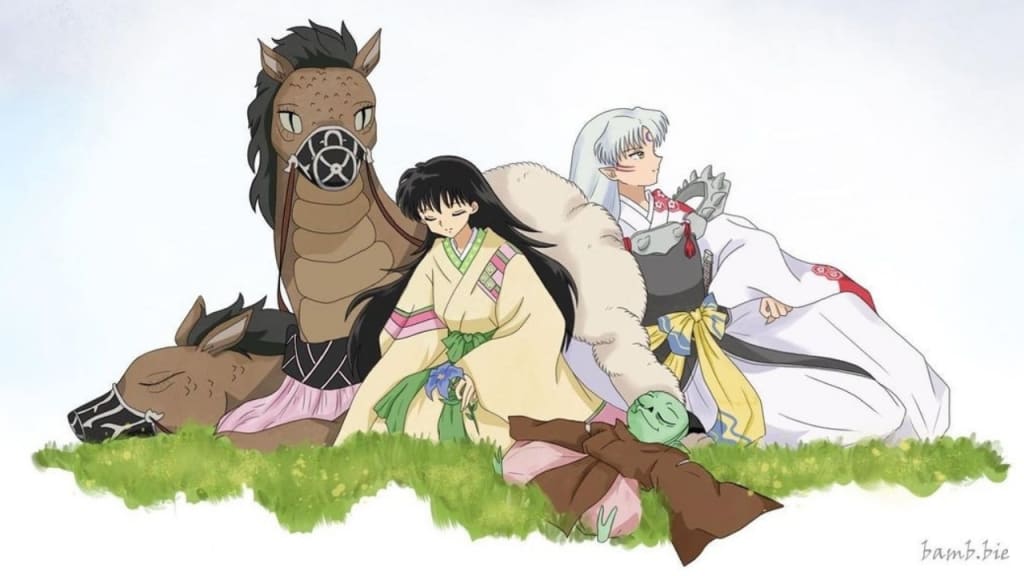
Why Sesshomaru and Rin have the healthiest dynamic in the InuYasha franchise. Covering content from the InuYasha manga, anime, films, drama CD "Asatte," and aspects of the sequel series, "Yashahime: Half-demon Princesses" (also known as "Hanyo no Yashahime").
Intro duction
This article aims to explore the rationale for “Why Sesshomaru and Rin have the healthiest dynamic in the InuYasha Franchise” as I want to focus on their dynamic, and use this word over a "relationship." Because a relationship oftentimes has the connotations of romance, overlooking notions of the platonic nature of relationships. This analysis will focus on Sesshomaru and Rin throughout the InuYasha franchise (anime, manga, films, drama CD, and sequel), mainly analyzing the events depicted in the original series, where they are at the time, platonic.
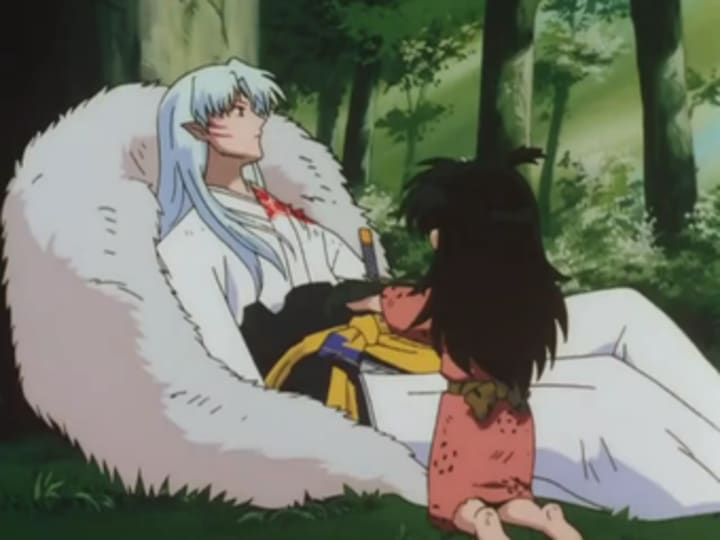
The Significance of the First Encounter
Sesshomaru meets Rin in episode 35 of the anime/chapter 129 of the manga, following his unsuccessful battle with InuYasha’s wind scar. Tenseiga, knowing its owner’s life is threatened, sends Sesshomaru to a place that it knows is safe, peaceful, and conducive to his well-being. That place being the nearby forest of Rin’s (at-the-time) home. When Rin first meets Sesshomaru, she recognizes the pending danger of his presence — he’s not human, but he’s hurt. And to some degree, she likely resonates with that. Sesshomaru was all alone, hurt, mentally non-intact, and the most vulnerable we had seen him in the series (even compared to him losing his left arm as we hadn't seen the aftermath of that yet until episode 133-134). She’s a poor peasant girl who’s suffered immense trauma, suffering, and loneliness. Her initiative to help Sesshomaru came from her generosity; her empathy in seeing someone who reminded her of herself. She offers him food and water, to his dismay of course. But does not take no for an answer — this establishes a part of her personality that may be overlooked: her unwavering and kind-hearted stubbornness. She does not take no for an answer. Rin probably thinks to herself that her fish she gave him was not good enough because she’s been conditioned lately to believe that she’s not good enough. She returns to the village reserve and steals some fish, not for herself, for him. After receiving a beating, she does not flinch or show any signs of remorse but progresses on with her merry way. At this point, it’s observable that despite knowing her story, her scars, and her difficulties, humans do not even empathize, let alone sympathize with Rin. It is the feudal era, after all. She’s a young, disabled orphan and the villagers only see her for what she lacks: a voice, a family, and a place of belonging.
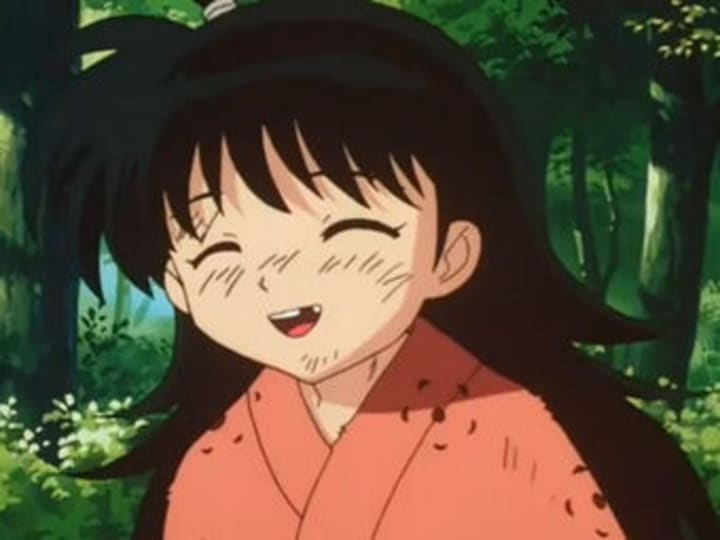
When she returns to Sesshomaru, without the fish, Rin is visibly shyer, feeling like she had failed her mission but she nonetheless returns out of her stubborn, kind-hearted and generous nature. Sesshomaru would never accept her attempts of rescue, but her dishevelled and pained appearance intrigues him. When he asks about her bruises, this is the first time anyone had ever afforded her a second glance.
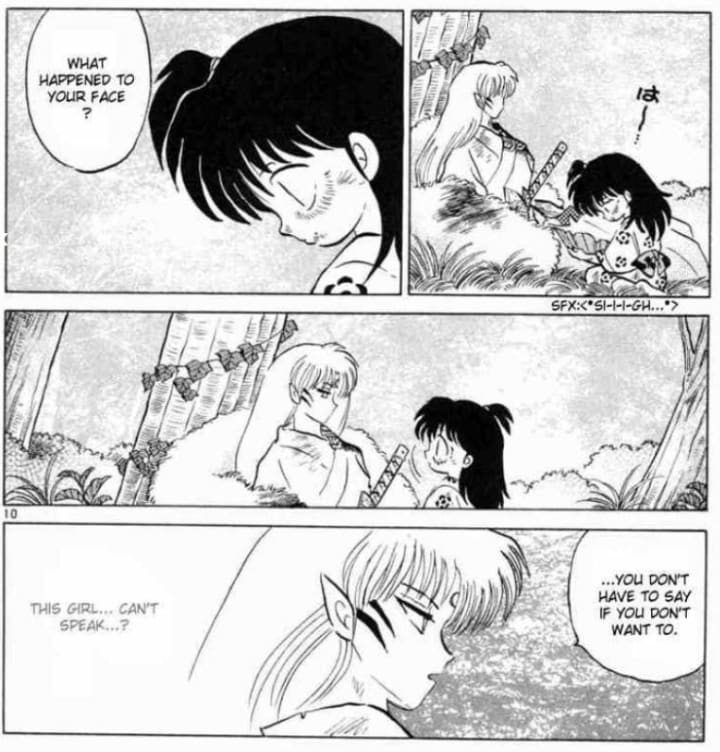
The audience can see Sesshomaru calculate her body language, recognizing that she is mute. Instead of pressing her further or ignoring her outright, he attempts to comfort her (in his own way), making her feel that it is okay if she chooses not to answer him; that her desire to reply to him should only be a desire, not an obligation. I think, on one hand, that was the first moment of something that would resemble compassion that Sesshomaru had ever administered, trying to put himself in her shoes — if someone had asked him to do something that required, for example, his left arm, he probably would have appreciated them saying “you don’t have to do it if you don’t want to” so to provide him agency for something that he actually cannot do. And the same goes for Rin. He recognizes her disability, maybe even resonates with it and decides to empower her with a choice. Choice is important when it comes to the Sesshomaru/Rin dynamic and it’s a word that will come up often. This is the first of many choices that Sesshomaru allots Rin in dictating their soon-to-be long-lasting relationship, laying the foundation for their connection as the series progresses.
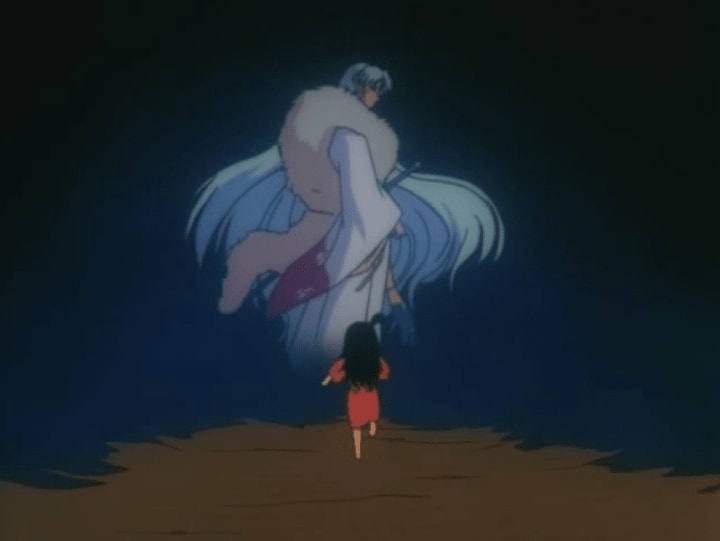
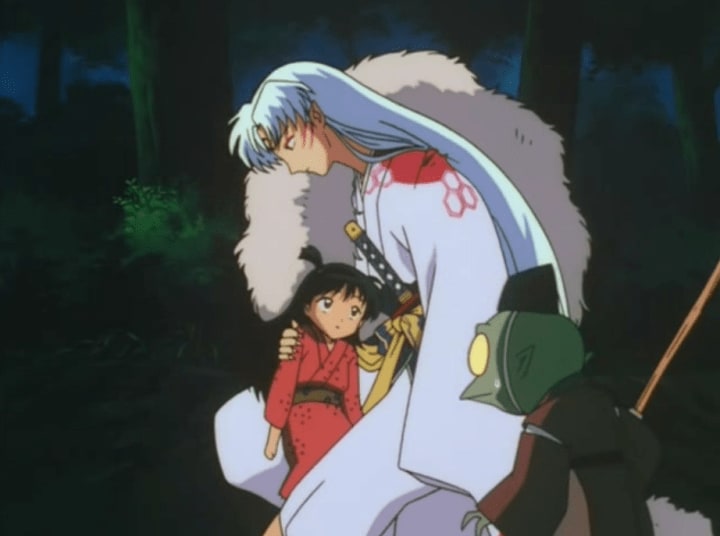
"The first time she was revived, the moment she opened her eyes, they exchanged a soul gaze, which harmonizes the energy between two people. They maintained deep eye contact for nearly half a minute. There were no words, Rin had no opportunity to say thank you, and Sesshomaru asked her no questions. They said all that was needed to be said through their silence."
The next time Sesshomaru sees Rin, it is suggested that he actively sought her, whether it be by curiosity or concern for well-being. It's evident that Sesshomaru had never experienced an interaction like this before and if we just collect the facts we know about him, his reaction is quite logical. He had been born into aristocracy to political parents and was a lord the moment he left the womb. Everyone around him feared him or needed something from him. His chance of a genuine relationship (friendship, family dynamic, or even romance) would have been limited and/or superficial from the get-go. They see him in armour, finely dressed, and never vulnerable. But when Rin first meets him, she doesn’t treat him like her lord, king, or anybody special, she is immediately exposed to his vulnerability. She sees him at his worth. She treats him just as she would likely treat anyone else if they were in need. Rin’s authentic and warm smile plant the seed of compassion in his icy heart because he hadn’t come across this type of raw intention for well-being and to his deduction, he could have felt one of two things (maybe even both): (1) compelled to reward her with another shot at life selflessly, and/or (2) an inquisitive desire to seek that perplexing feeling that her smile gave him. When Rin wakes up, the first face she sees is his. When she died, the last face she saw was his, albeit imagined. Upon her revival, she pursues him without a single word from either party.
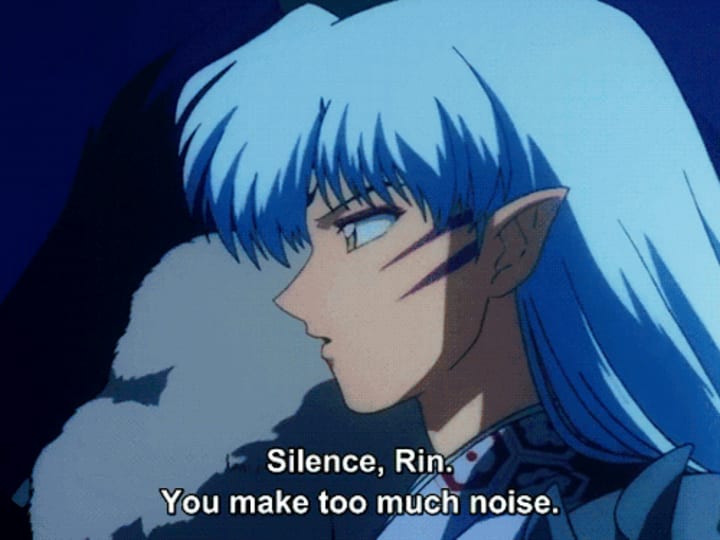
Silence, Rin.
Following this encounter, we next see them at Goshinki’s corpse (episode 44/chapter 157 of the manga). Rin screams endlessly, annoying Sesshomaru. Firstly, this is the first time we hear him call her by her name. Secondly, Sesshomaru is visibly annoyed by her noises, however, he does not tell her to “shut up” as he normally would with Jaken or even InuYasha. He simply says “enough of that Rin, stop it.” (In Japanese he says, “Silence, Rin. You make too much noise.”) Even analyzing the Japanese dialogue, it is evidently softer than Sesshomaru’s usual ‘kisama’ (貴樣) manner of speech that we see depicted usually. This is the first time he’s had a companion who is not a demon, someone with compassion, and who has had his general best interests at heart with no expectations in return. His softer tone is a logical deduction to make. Unlike Jaken, Rin is there of her own free will. This is the first time Sesshomaru has dealt with someone’s actions that he dislikes and killing them is not an option. He’s uncomfortable with her behaviour around him and immediately shuts it down. Rin doesn't change Sesshomaru overnight, it's a gradual and long process (approximately 193 episodes + 4 movies to be precise) and his slightly softer tone in her second appearance marks the beginning of a long journey.
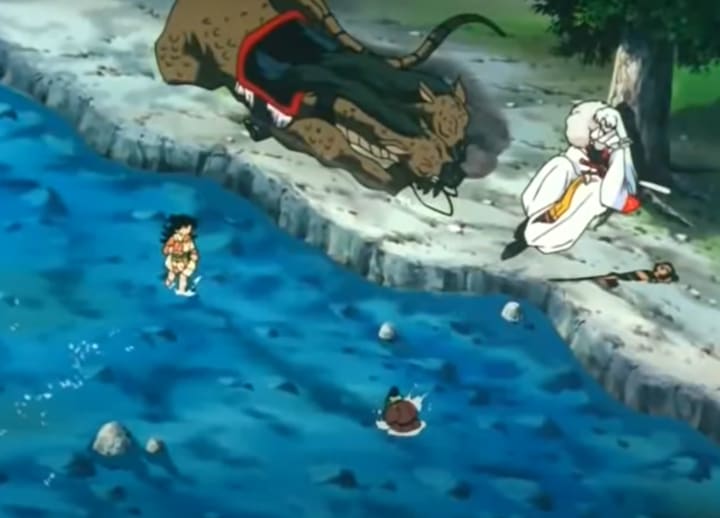
Letting you Be Yourself: The Panther Demon Arc
Jumping ahead to the Panther Tribe arc, Sesshomaru’s gang hangs out by a ravine, the first frame the audience sees in the anime sets the scene, painting the Sessshomaru entourage in a serene manner, indicating a level of comfort between group members (episode 75). This is vastly different from our last depiction of Sesshomaru and Rin’s relationship. In episode 44, he was unable to withstand her (albeit annoying) childish antics. But here, it’s observable that Sesshomaru can accept her and her package of unconventional fun. Not only does he tolerate and even more so, accept Rin, but he accepts her influence on his vassal, Jaken and allows them to be free around him. Jaken had once stated he had served Sesshomaru for decades (later centuries, the duration is still unclear). This might be arguably one of the first times Jaken had ‘enjoyed himself’ leisurely in front of Sesshomaru.
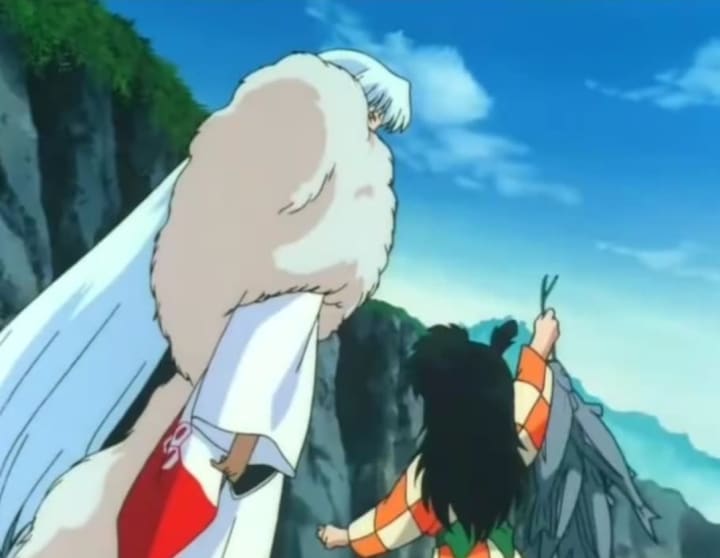
Let’s not mistake this with Sesshomaru changing his personality or anything like that. He obviously doesn’t join in on their foolish fishing attempts. One Youtube comment summarizes this particularly well: “The most interesting part of Sesshomaru's character development is that he doesn't so much warm up to his friends as he does open himself up to playing along with their goofier activities. Compare how he shuts Rin down when she was screaming over his harvesting Goshinki versus him just chilling out and playing lifeguard while Rin and Jaken goof around fishing in the river. He never stops being himself, he lets others be themselves around him” (Ninetails2000 via YouTube comment: Sesshomaru, Rin and Jaken Funniest Moments) .
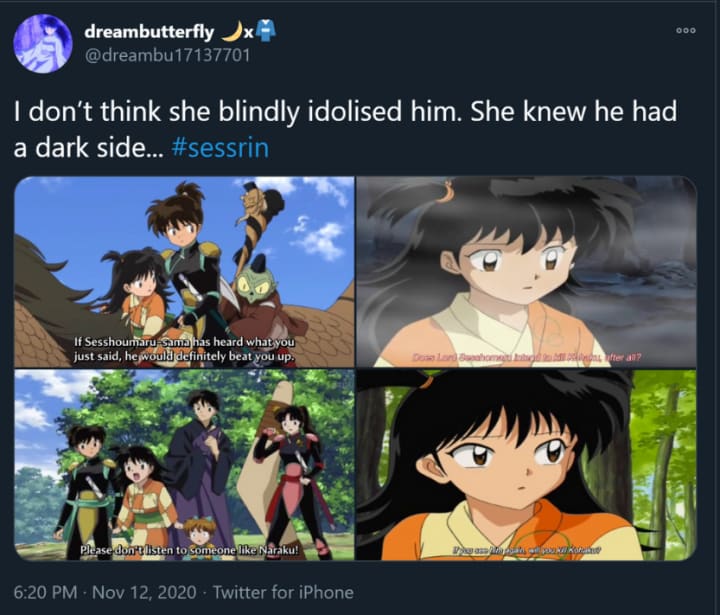
This observation is key as Rin does not change Sesshomaru’s personality — she doesn’t actively affect his nature, nor does she, compared to other females in the franchise, attempt to gain something from him, actively attempt to change him, or berate him for a particular trait. Some examples may include Kikyo’s desire to transform InuYasha from a half-demon to a full human; Sango’s disdain for Miroku’s flirtatious tendencies; Kagome’s jealousy towards Kikyo; or Kagura’s insistence to mechanize Sesshomaru to grant her freedom and destroy Naraku. That’s not to put down these dynamics necessarily either though. Each of these women has a justifiable reason to have issues with these traits and to be incentivized to change or "get something" out of their respective counterparts. On the other hand, that’s also not to say that Rin blindly admired Sesshomaru. “She knew he had a dark side" (@Dreambu17137701 via Twitter). Rather, the difference is that Rin also contextualized his dark side. She understood he was a demon, “an evil spirit” (episode 162), someone who literally embodied the name, “Killing Perfection” and proceeded to withdraw any expectations on him.
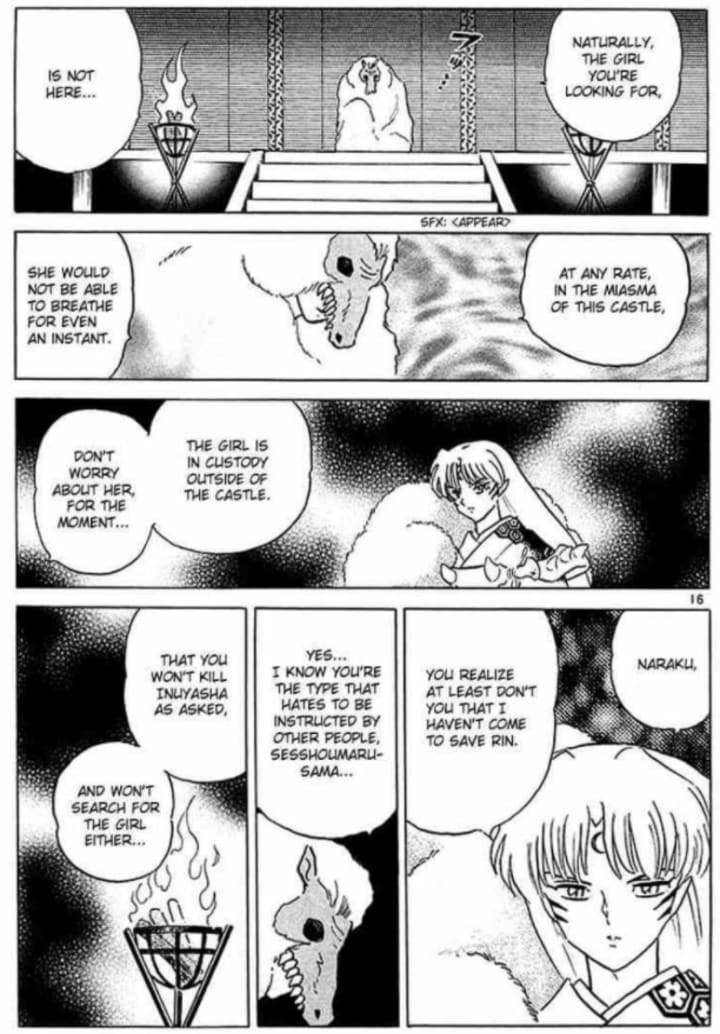
The Abducted Rin: Calling her Name
The respect that Sesshomaru shows Rin is insurmountable. However, the InuYasha franchise is clever to portray the subtlety of Sesshomaru’s respect for her. KV on Twitter points out how highly he regards his companion and never relegates her to anything less than the value that she as a person embodies (@KVndie via Twitter). He consistently humanizes her. This is observable when Naraku kidnaps Rin to lure Sesshomaru to his castle (episode 80/chapter 219 of the manga). As Naraku remarks on his hostage to Sesshomaru, "Naturally, the girl you're looking for is not here…,” he continues, “the girl is in custody outside of the castle..." Naraku never makes an attempt to give her personhood, leaving her unnamed, disposable, and relegating her to a mere "girl." But Sesshomaru doesn’t take any of this. He is a cold-hearted Daiyokai, yet he still makes an effort and upholds his principle to refer to her as Rin — not a replaceable “girl.” She has an identity, a name, and a connection to him. Most importantly, this isn’t something he keeps to himself. Sesshomaru purposefully says her name out of his respect for her, but also to tell Naraku her name. Naraku can be disrespectful to Sesshomaru as much as he wants in his speech, but what Sesshomaru asks/requests/demands of Naraku is that he learn her name because Rin is somebody outside of Sesshomaru — Rin is somebody. (Of course, he’s completely full of shit when he says he’s not there to save her but that’s a different discussion).

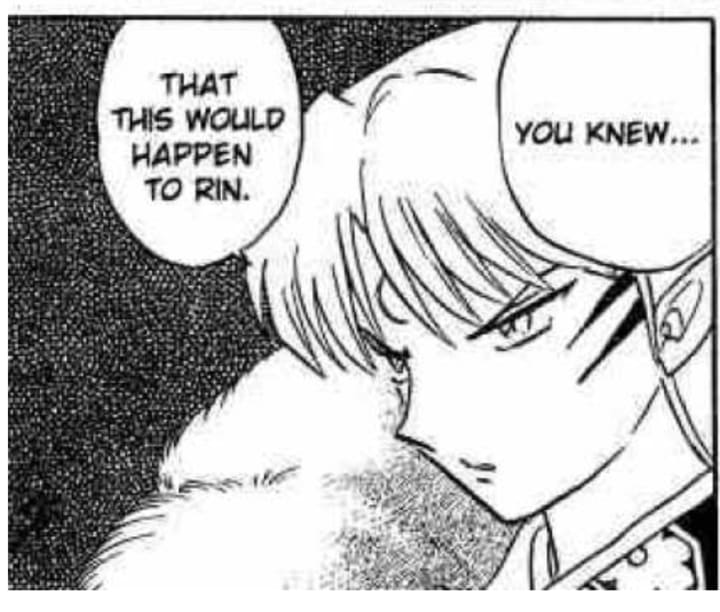
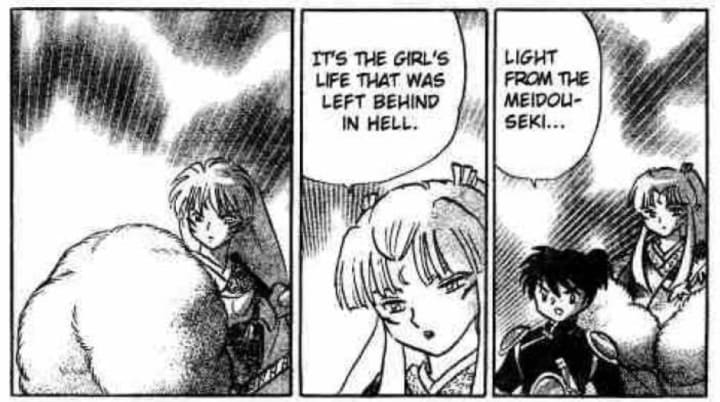
Sesshomaru’s insistence on using Rin’s name isn’t only highlighted in this isolated incident though. It pays off. It is an ongoing theme in their dynamic throughout the series. I could compile all of the moments where he says her name, but I don’t see a whole lot of value in that for this particular piece. Sesshomaru repeats this habit of his, saying Rin’s name repeatedly, especially when the person he’s speaking to does not use her name. This is prominent when he speaks to his mother in The Final Act episode 9/chapters 467-471 in the manga.
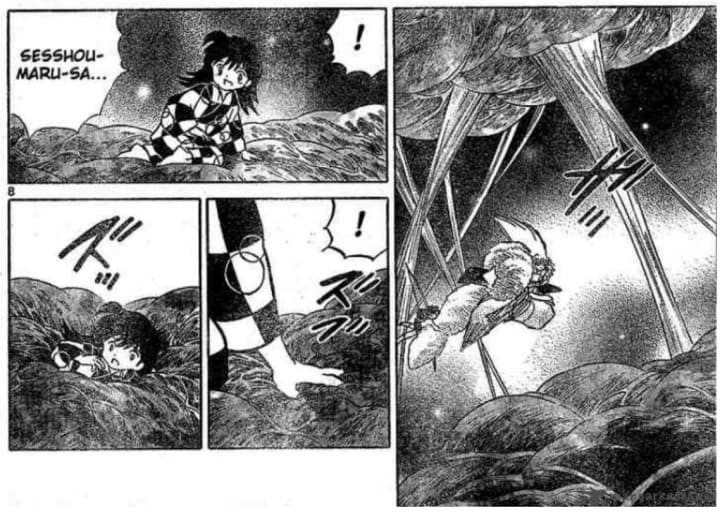
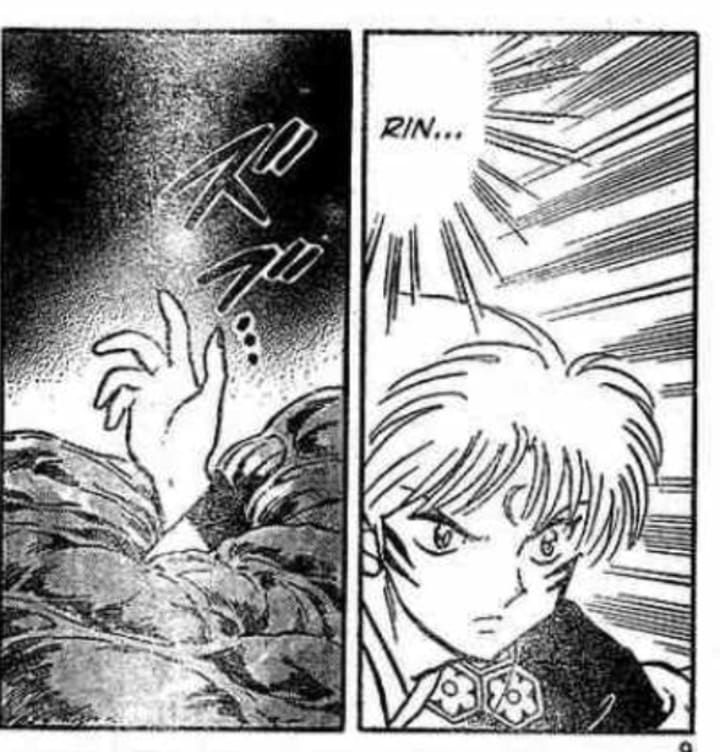
The other notable instance I want to highlight is in the Final Act/the final chapters of the manga, inside Naraku’s body during the last battle. When Sesshomaru goes to save his, once again, kidnapped Rin, we are not given any clues on his inner monologue, other than when sees her and calls for her internally.
Koga and Sesshomaru : A Heart-changing Encounter
As the story progresses, a gradual open secret within Sesshomaru's entourage beings to form: Sesshomaru kills fewer and fewer humans as their journey continues, especially from his encounter with Rin and onward. When he knows he is going to take a life, he tries his best to do it out of Rin’s sight. And he only decides to actually go for the kill when it is the most logical and safest option, it doesn’t become his go-to response anymore. This is evident in the anime-only depiction of Ginta and Hakkaku’s first encounter with Sesshomaru (episode 99). Sesshomaru is obviously displeased with their presence, smelling the wolf scent on them and recognizing Rin’s fear. Based on the information we’d know about Sesshomaru prior to episode 35, he likely would have slaughtered them without a second thought (having killed the pack of wolves in episode 5 and soldiers/samurais/robbers as well without hesitation).
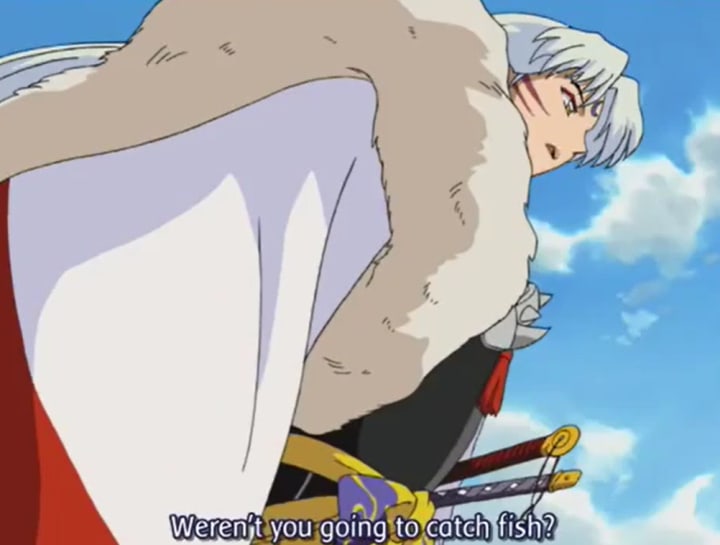
But his focus isn’t even on them in their encounter. He’s most concerned about comforting Rin, recognizing it was a trauma for her, recognizing they were the cause for her to cross over to the afterlife, even for a brief moment. Once they depart hastily, he does not engage in pursuit. He just turns to Rin and diverts the subject calmly: “Uhh...Rin. Weren’t you going to catch yourself some fish?” It’s really adorable if you think about it. Sesshomaru is a man of very few words and from what the audience can deduce, with very little social skills. But he still parts his lips and comforts his young travel companion the best way he can.
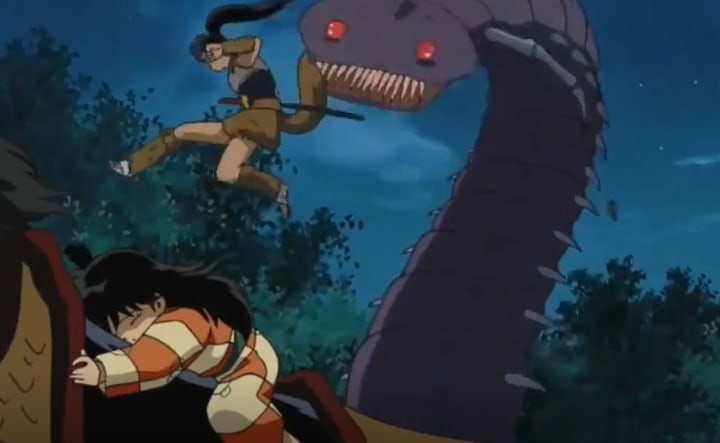
At the climax of the episode, Hakkaku and Ginta return again in an attempt to “block off” the path that the Sesshomaru entourage intends on taking, knowing that Koga is ahead. Even at their laughable attempt of a detour, Sesshomaru does not immediately get in an offensive position. He just stands there, arguably dumbfounded, amused, or disdained (his reaction is up to the audience) and narrows his eyes to convey that he sees right through their bullshit. Even when they don’t falter, Jaken monologues: “Are they trying to get themselves killed?” Coincidentally a demon emerges at the moment Koga makes his appearance and the young wolf tribe leader protects Rin from being eaten, outpacing Sesshomaru during his defence attack (due to the assistance of two Shikon jewel shards in his legs). The takeaways here are abundant. The most obvious one being Sesshomaru’s reluctance to kill immediately, if not framed as reluctance, then intentional delay. The second would be Sesshomaru’s gradual progression and objective to minimize suffering. He likely doesn’t even recognize this aspect of himself changing, but he doesn’t want to kill for no reason or freely as he did in our first introduction of him. Rin, on the other hand, doesn't harbour any ill will against Koga or the wolf demons subsequently. And I think this is fundamental to Sesshomaru’s choice whether to go after them or not. He respects Rin’s agency, her desires, her wish to abstain from “unnecessary conflicts” as he verbalizes to Jaken (though he jointly frames this as his own desire: “Unnecessary conflicts don’t interest me”). But what’s hidden between the lines is his understanding of Rin’s wishes. She’s over her fear of wolves. She harbours no resentment and wishes to proceed. She has grown. Sesshomaru didn’t have to ask. And had Rin blatantly said to him, “Lord Sesshomaru, they were the ones who attacked me. I am still afraid of them.” I’m sure most viewers would come to the conclusion that he’d destroy Koga. But the decision to allow the wolf trio unscathed was not solely Sesshomaru’s decision. It was a joint decision, an unspoken understanding between him and Rin.
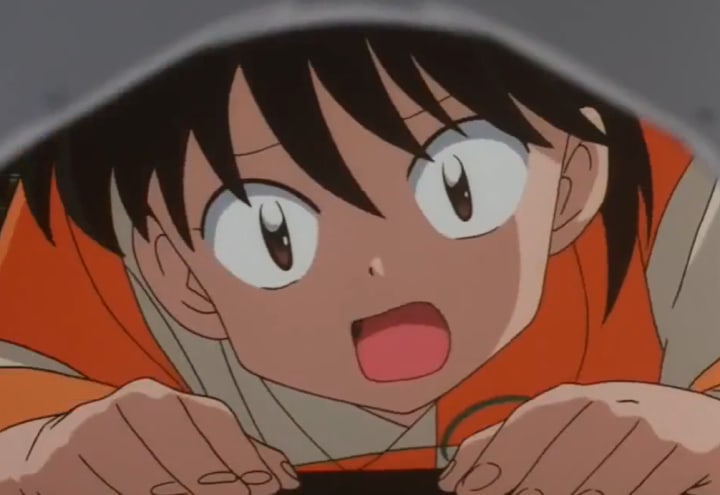
Jaken Falls Ill
When Rin falls from her rock-climbing expedition to attain the Sennensō berry (千年草の果, せんねんそうのみ) antidote for Jaken, she iconically calls for Lord Sesshomaru. In her perceived-to-be last moments, his name is the one she calls. Hearing her cry, he arrives immediately to catch her and the two make their way to save Jaken. Rin, of course, unconscious. There are two points I want to highlight in this episode: Firstly, Rin’s desire to minimize death. In the anime, no less the manga, there are few moments of character development for Rin. Historically, she might’ve been one of the most underrated characters on her own without her relationship with Sesshomaru. But this analysis is meant to highlight their dynamic and the best way to do that is to examine each character on their own as well. From the short two-line backstory we get in her introduction, she was someone who had next to nothing, who had lost everything. Jaken is one of the closest figures she has to kin in the story. The thought of losing him pains her so deeply that she’s willing to go to the border of hell and back to keep him in this life. Her actions in combination with her words establish many major character traits for her at this 96-episode mark, many of these qualities comparable to our protagonist, Kagome as noted by Jinenji.
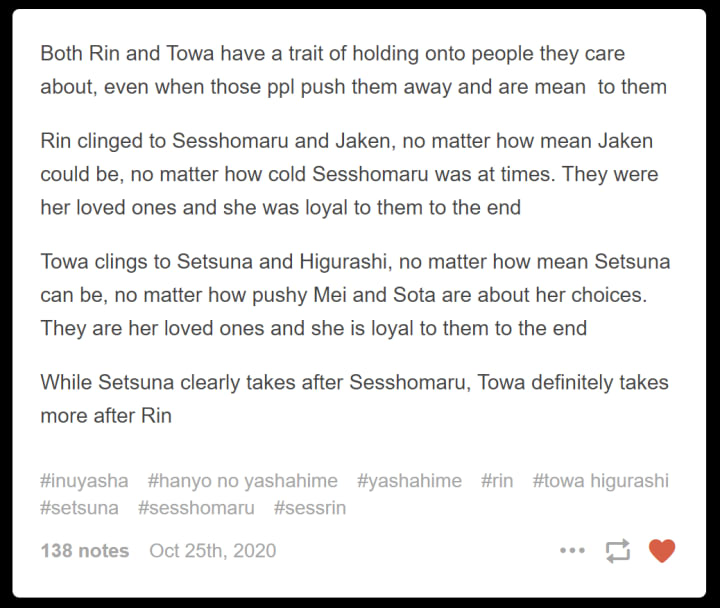
Rin is kind-hearted, extroverted, easy-going, unprejudiced, she values life and companionship dearly. "Rin certainly has a trait of holding onto people she cares about, even when those people push her away and are mean to her" (@Nastywomanfan via Tumblr). Despite the prominent banter between her and Jaken, Rin does not hesitate to risk her life for him. It’s indisputable that Rin values life, but this instance demonstrates that she values lives as well. Even putting others' lives above her own. She had been brought back from the dead once but did not blink to waste her second chance in order to save a loved one.
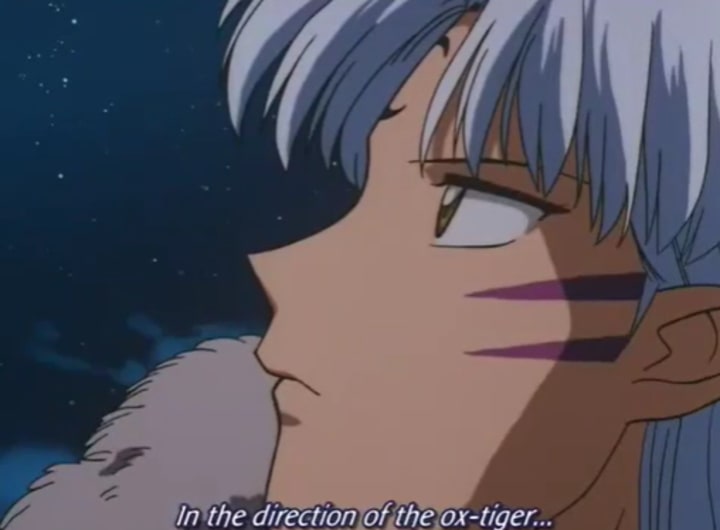
The second point I want to highlight here is Sesshomaru’s reaction to Rin’s fall and her risky expedition. At this point, it’s unquestionable that Rin has a special place in his heart. To most, the idea of Sesshomaru bringing someone back from the dead and that very same person throwing that second chance away to save a servant of his is kind of unsettling. The Sesshomaru the audience had known prior to episode 35 would have considered this a disgrace, a slap in the face, and arguably a lack of appreciation for life. But this couldn’t have been more false in reality. Rin’s decision to risk her life and take on the burden of seeking out the antidote solidifies her freedom, her choice, her power to take direction in her own life. Because she is living her life, not a life that Sesshomaru expects or imposes on her. This episode subversively establishes the free will and hierarchy of Sesshomaru’s gang. As AxelBeats! puts it simply, “Everything else she [Rin] does, is totally her decision. While Jaken is a servant to Sesshomaru, Rin is free and is there of her own will” (AxelBeats! "The Story of Rin and Sesshomaru - InuYasha and Yashahime").
When she awakens, it is Jaken who berates her for her foolishness in classic Jaken manner, more so out of love than disdain, really. But Sesshomaru is not bothered by her dangerous decision. He doesn’t view it as a slap in the face to Tenseiga. He knows Rin is a person, maybe the first person that he truly sees because she showed him the first instance of humanity in his immortal life. He recognizes her agency, that he brought her back to live her life, not a life that she owes him because he doesn't see it that way. She owes him nothing. She chooses to follow him and she chooses what she wants to do with this second chance. He accepts her decision, does not question it, regardless of what direction she decides to take.
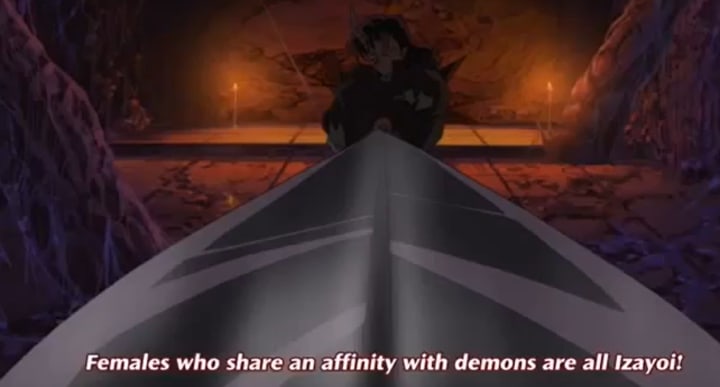
Rin and Kagome: Cut from the Same Cloth
I’ve previously explored the similarities between Rin and Kagome, beyond their evident physical similarities, noted by Jinenji. Both Rin and Kagome are characterized [by Takemaru of Setsuna] to be “humans with affinities to demons” (Inuyasha Movie 3, Swords of an Honorable Ruler). Both of their names are written in Hiragana instead of Kanji. This could/is likely to have been a choice purposely done by Rumiko Takahashi as their Hiragana names do not have as “straight-forward” of meanings as it's Kanji name counterparts. Rin’s name can mean anything ranging from a "bell" to "dignified", "cold", or "companion" ("Rin" Trivia, Wiki). In the series, it is explicitly expressed that Kagome has a large soul. Lawless Lane remarks on this with Rin in mind: “It was also noticeable that her [Rin] soul was incredibly large as it was released from the underworld. I don’t believe that was done for theatrics. Like Kagome, her soul was large and powerful. That’s why Kanna couldn’t hold Kagome’s soul in her mirror” (Lawless Lane, "Sesshomaru and Rin: The Silent Soul Love").
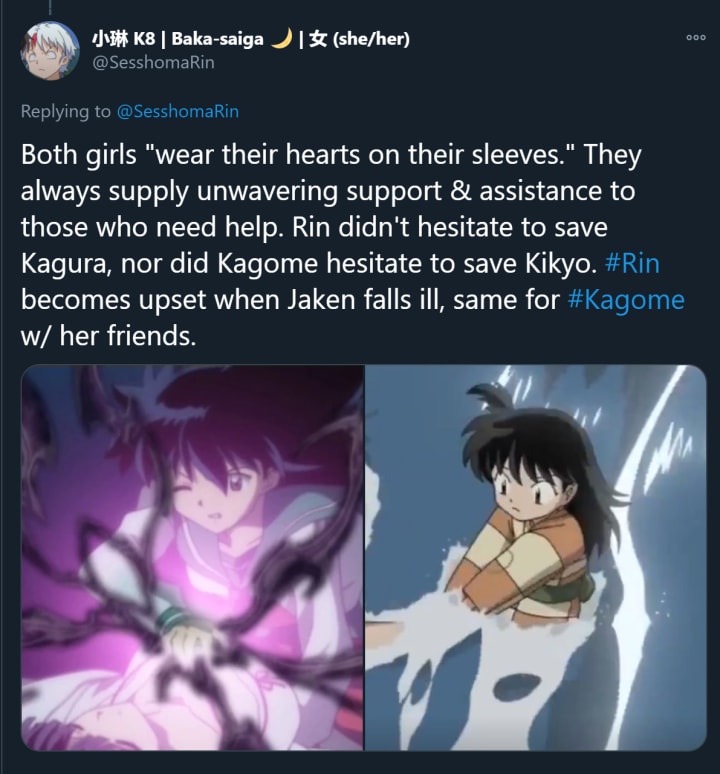
The two human girls are characterized by their selflessness as well. They always show unwavering support and help those in need, especially when it matters and when the average person would probably walk away. This is epitomized in Kagome’s countless instances where she saves Kikyo, her explicit love rival who, all things considered, she has no (self-interested) incentive to save, but she still does. Likewise, Rin didn't hesitate to save Kagura. Kagura, like Kikyo, had also posed ill-intentions to Rin. Kagura was Rin’s abductor, someone who enabled Naraku’s manipulation of her dear friend Kohaku, and the vassal of her lord’s archnemesis. But Rin looked at Kagura the same way Kagome looked at Kikyo, arguably even more selflessly (albeit with a lens of child-like naivety). Rin looked at Kagura and didn’t see an enemy. She saw a helpless woman, who nobody cared to bat an eye at — not even her beloved and perceived-to-be-kind-hearted Lord Sesshomaru paused for her. Rin didn’t take issue with Sesshomaru’s ambivalence. She took it into her own hands to save someone, who to her, was relatable. To her, Kagura was just as pathetic as Rin had once been — alone and uncared for.
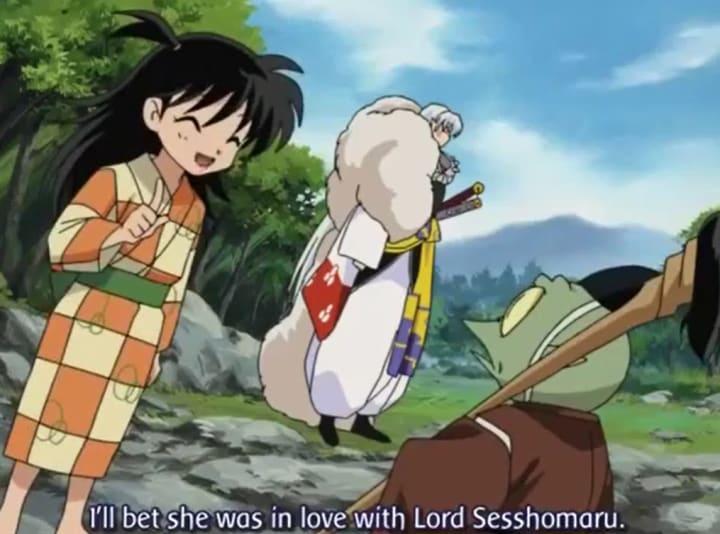
The situations mirror each other iconically: both Kikyo and Kagura were vulnerable in water and both human girls had an explicit choice whether to take action. Even in the aftermath, neither Kikyo nor Kagura expressively thanked their saviours. For Kagome, this causes great emotional pain to her, and rightly so. She’s 15. She had saved someone’s life and almost drowned. Her love interest finds her afterwards, ignorant of the situation, and presses her about a topic that drags her heart. But for Rin, this doesn’t visibly bother her at all. She does not see Kagura as a threat and she understands that she wasn’t entitled to a thanks (although it would have been nice).
Interjecting my own personal thoughts here: This is likely because Rin resonates with Kagura’s situation to an unexplored degree. Kagura was saved from death without having asked for it, just like Rin. Kagura was abandoned, alone, and uncared for, just like Rin. Kagura had only felt pain and manipulation for most of her existence, similar to Rin’s perpetual abuse prior to meeting Sesshomaru. The difference is when Rin was met with the kindness she received from Sesshomaru (which in all honesty, was just common decency), this fuelled brightness in her heart and her disposition physically. When Kagura was met with the kindness of Rin (and Sesshomaru after Rin’s failed rescue mission), she had trouble processing that. Processing the first instance of decency and kindness. And that makes sense. Rin’s a child who’s approximately eight years old (there’s no canon age for her, but let’s just compare her age relative to Sota). Kagura has been around for less than a year (since episode 39). Their emotional intelligence, experiences, and outlooks on life are vastly different in nature alone.
Rin later makes a cheeky comment, noting Kagura’s romantic interest in Sesshomaru. Jaken brushes this off as childish naivety. But for the spectator, this establishes two things: (1) That Rin does not see Kagura as a rival for Lord Sesshomaru’s attention, let alone affection; and (2) that Rin is still a child. Rin is certainly a child, with a youthful and fresh outlook on life that brings out the best in people. But even as a child, her relationship with Sesshomaru is incredibly healthy, clear, and surprisingly communicative. Surely, this strong bond that she shares with Sesshomaru evolves as time goes on, likely off-screen and succeeding the events of The Final Act, preceding the events of Yashahime.
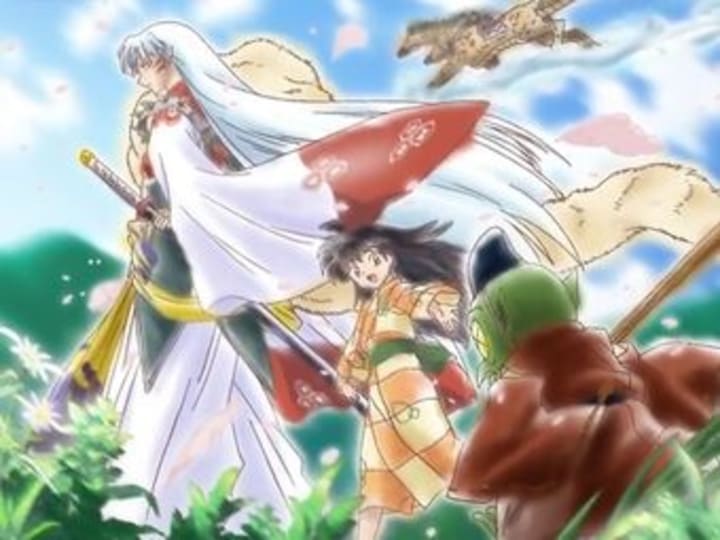
Forever with Lord Sesshomaru
There are plenty of excellent analyses of this episode, a major milestone of Sesshomaru and Rin’s character development, as well as their dynamic. In short, the episode sums up the choice-driven dynamic of Sesshomaru and Rin. The audience gets a taste of Rin’s backstory and why she follows Sesshomaru.
"My father, mother, and brothers...they were all brutally murdered by bandits." -Rin, episode 162.
We also get hints at the growing effect that Rin has on Sesshomaru’s heart and even outlook. The episode begins with Sesshomaru peering over a village under attack by night robbers. He observes the tragedy in disdain and walks away, only to be met with contempt by the bandits. As they attack him, he immediately slaughters them all (in defence) without hesitation. This juxtaposes Sesshomaru’s previous reluctance to kill immediately when he first met the wolf demon tribe in episode 99. I’d like to think the difference is that here is that firstly, the intent of the bandits is evidently evil, whereas with Hakkaku and Ginta, it was uncertain. Secondly, in this case, Rin is not in the audience. Killing demons in front of her is one thing that he already tries to avoid, but killing humans in front of her is something he likely could not bring himself to do (as much as he’d deny it). This scene establishes Sesshomaru’s evolution in how he operates as a killer, but also as a demon.
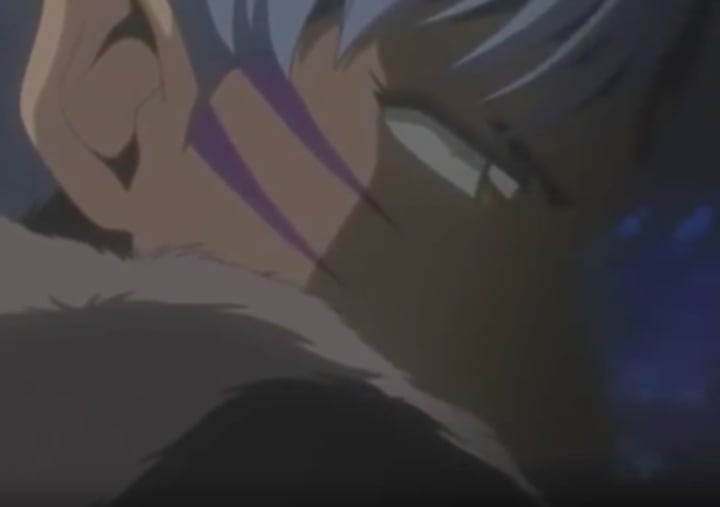
As the episode unfolds, the iconic scene where Rin expressively chooses to be with Lord Sesshomaru over demons takes place as the Monk Ungai dismisses her pleas. Isobel Hughes on Tumblr points out one of the most noteworthy and subtle directions of the episode and summarizes it brilliantly: “I think it’s notable that we only see him [Sesshomaru] from the side for this scene as it really gives the impression that he’s prepared to walk away. If you disagree, well, I’d say this: If his initial decision was to take her away from the Monks no matter what, the shot would have been frontal, antically a more combative shot – as it is when he does decide to come get her” (Isobel Hughes via Tumblr).
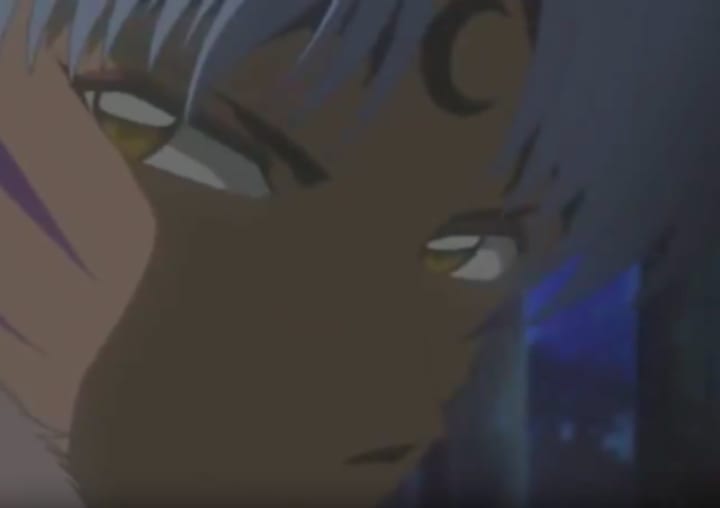
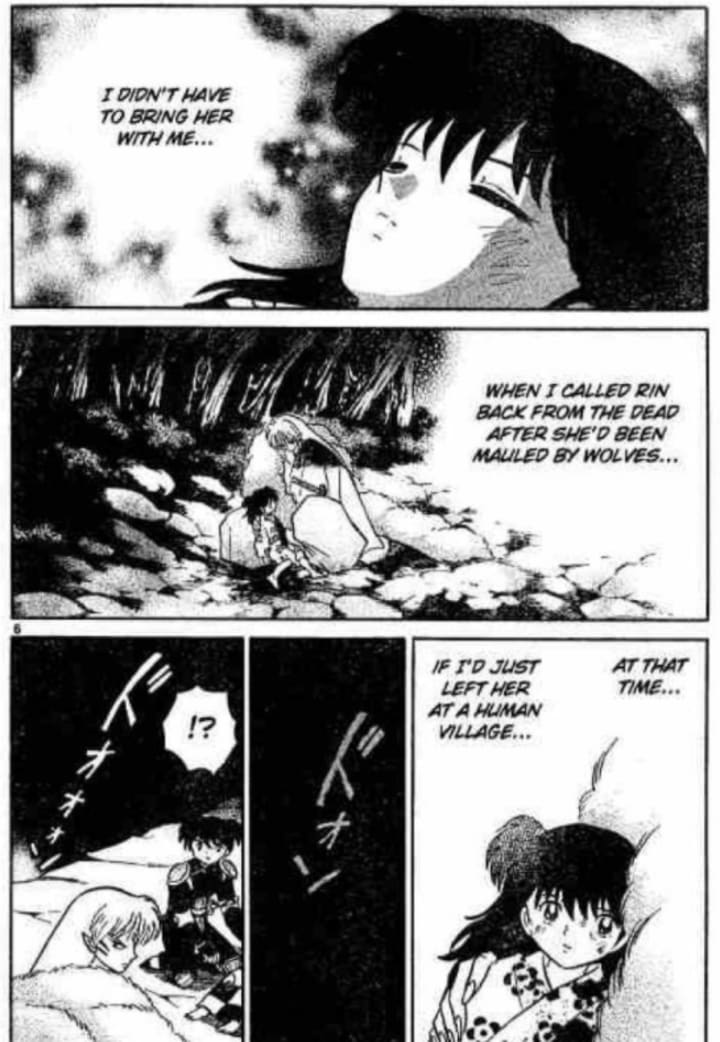
This point is important because it’s true. They don’t verbalize his monologue, but it is evident that Sesshomaru is weighing his options, more so, Rin’s options. In The Final Act episode 9, during Rin’s second death, he retrospectively reflects on moments like these where he debates if it is better to leave her with her own kind. He knows it’s selfish to keep her around solely because of their strong connection and tries to reconcile these feelings the best way he can. He attempts to do the bigger thing, but upon hearing her cry, her plea to be with Lord Sesshomaru, he makes his decision and honours her request, her wish, her agency.
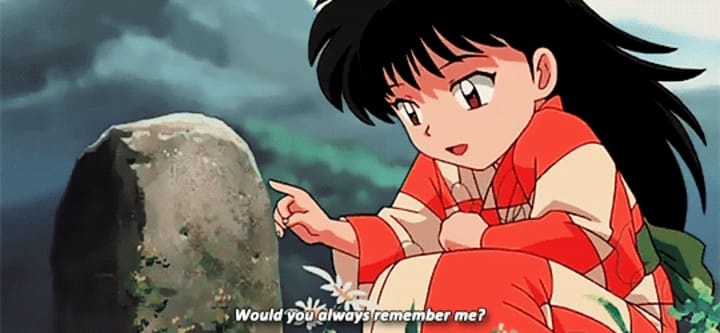
Let’s talk about Rin’s mortality now. This is a pretty taboo topic for Sesshomaru’s entourage on both Sesshomaru and Rin’s end. Surprisingly, it is Rin who handles the topic more maturely. She’s still a kid, but she has already seen the horrors that the world has to offer. I’d say of the whole cast, Rin has one of the most tragic backstories (on the same level as Sango, to me at least). She watched her entire family slaughtered, was left disabled, abandoned, and abused from then on. The best thing that basically happened to her was someone not striking her. Even though she’s a cheerful young girl, she’s far from ignorant. She accepts her lifespan, that being with Lord Sesshomaru is something with temporal restraints in the physical world she knows. But she also understands that her relationship with him is also something beyond the restraints (and norms) of the feudal era. She asks him if he’ll always remember her even in death, to his iconic shock, of course. Listening to this both in the Japanese original and English dub, you can hear Rin’s tone change. It’s subtle, but noticeable nonetheless. She’s melancholy, but not sad. She’s hopeful, but not happy. It’s sort of bittersweet. Because the statement is overwhelmingly mature. What I found most interesting about this scene was that Rin knows exactly what Tenseiga is. She knows Lord Sesshomaru possesses a godly tool that renews life. At this point in the anime, Sesshomaru and Rin do not know Tenseiga can only revive a person once, so to the both of them, life is infinitely renewable. But this doesn’t register in Rin’s mind. And this could be due to one of three reasons: (1) she forgot about Tenseiga: I find this highly unlikely as it’d be impossible for her to forget about the sword that brought her back to life and it’s on Sesshomaru’s hip as they speak; (2) She does not expect him to revive her when her time comes; (3) She believes that life is to be cherished and not something to be unnaturally prolonged (i.e., when she dies of old age, it would be “wrong” of her to be revived) and would rather be reborn in the next life.
Let’s explore the latter two reasons. Rin and Sesshomaru’s relationship is largely built on three pillars: respect, agency, and expectations (or lack thereof). Rin earns his respect out of her sheer will to help him, knowing he’s a danger. He earns her respect likely due to his benevolence to revive her and his polite response to her being mute.
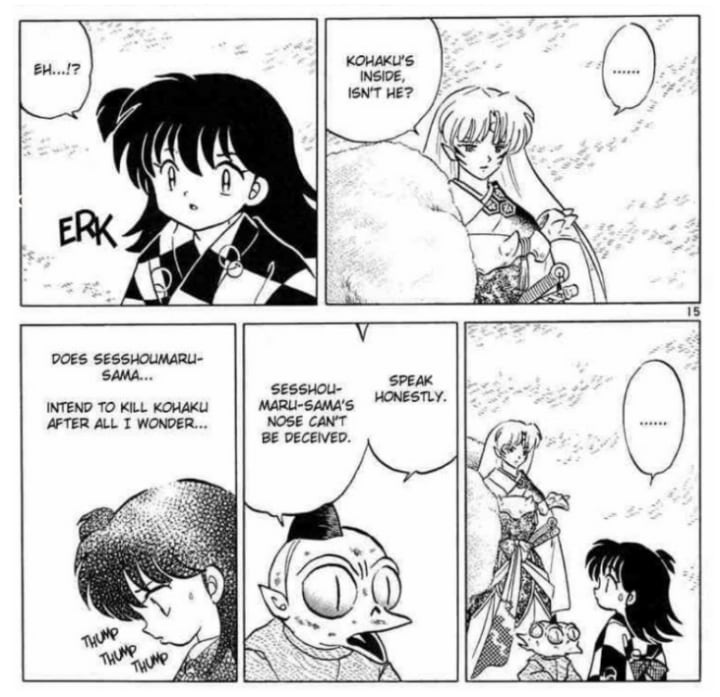
Sesshomaru respects every choice Rin makes. Her desires and wishes are understood and honoured the best way he can. Whether she chooses to follow him, to search for food (episode 96), to risk her second life for Jaken (episode 96), to defend Kohaku (episode 111), to tell him not to side with Naraku (The Final Act episode 15), to tell Ungai’s monks to piss off (episode 162), to be friendly with Kagome and InuYasha…
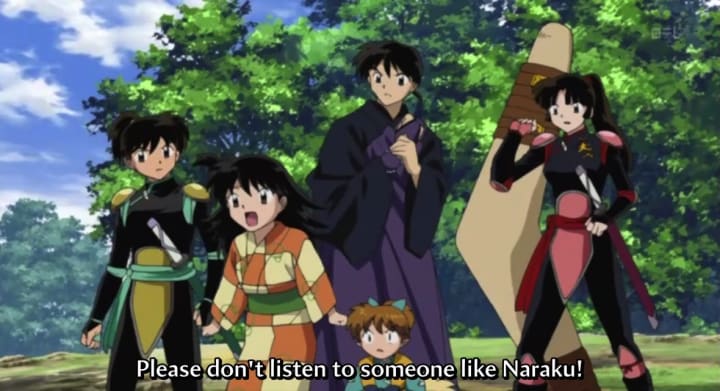
Sesshomaru never tells her what to do nor does he berate her for these things because he understands that when he resurrected Rin, he wasn’t going to live her life. The only expectation he has of her is for her to live her life. In the drama CD, where Sessshomaru proposes to Rin, it’s honestly barely a proposal. It’s more of a confession. He makes her an offer: to be with him. There’s no deadline for her to consider. There’s no ultimatum. Whatever she chooses, he is happy about it because what makes him happy is her ability to choose what makes her happy. Sesshomaru doesn’t impose his expectations on her. There’s no such dialogue or sign of “I revived you, so you must be my wife and bear my children.” And the best part of this is that Rin also doesn’t see it that way. She knows Sesshomaru has no expectations of her, he doesn’t pressure her to do or act the way he wants because if she felt that way, she wouldn’t be so out of line, she wouldn't be so distinctively Rin. This element of agency is important to rationale #2 because despite knowing he possesses a heavenly sword and knowing they share a strong bond, she does not expect him to revive her again and he does not owe that to her. Just like how she does not owe her life to him.
Regarding rationale #3, Rin lives in the InuYasha universe/Sengoku period dictated by Buddhism, where reincarnation is a common theme. Rin is also logical and embodies high morals. She understands it is selfish to renew life, prolong something artificially, and go against the intentions of the real world she understands. To put it simply, she understands that everything happens for a reason. This is most demonstrated in her acceptance of life again and her cheerful disposition. She’s been handed the worst of humanity but accepts the outcomes she’s been dealt with. So of course, the idea of Sesshomaru prolonging an aged exhausted Rin may be largely unsettling, unrealistic, and unnatural, regardless of the intent.
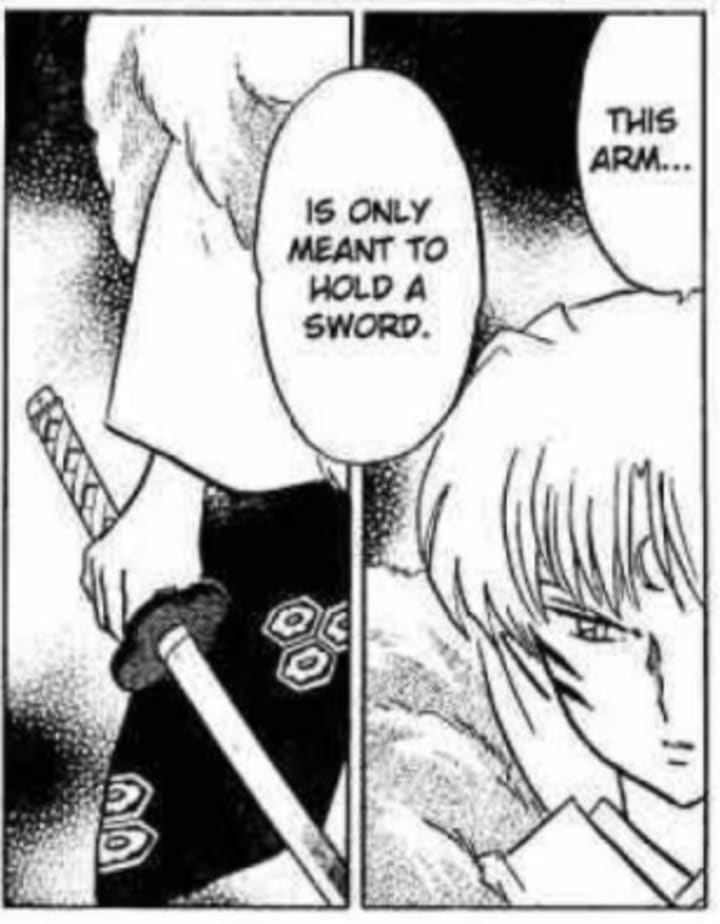
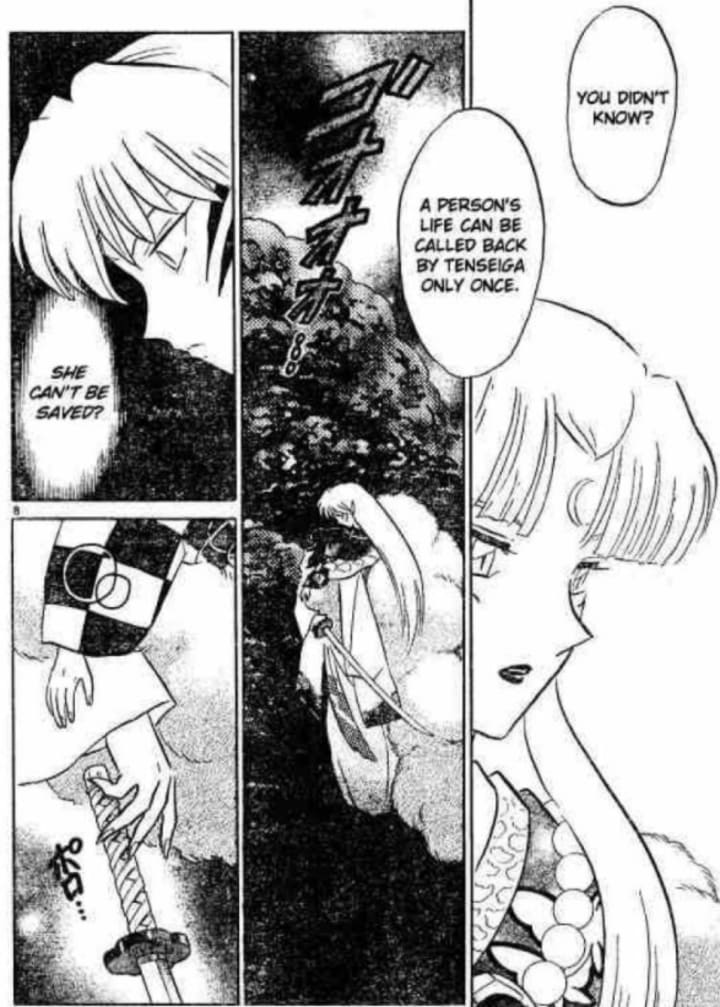
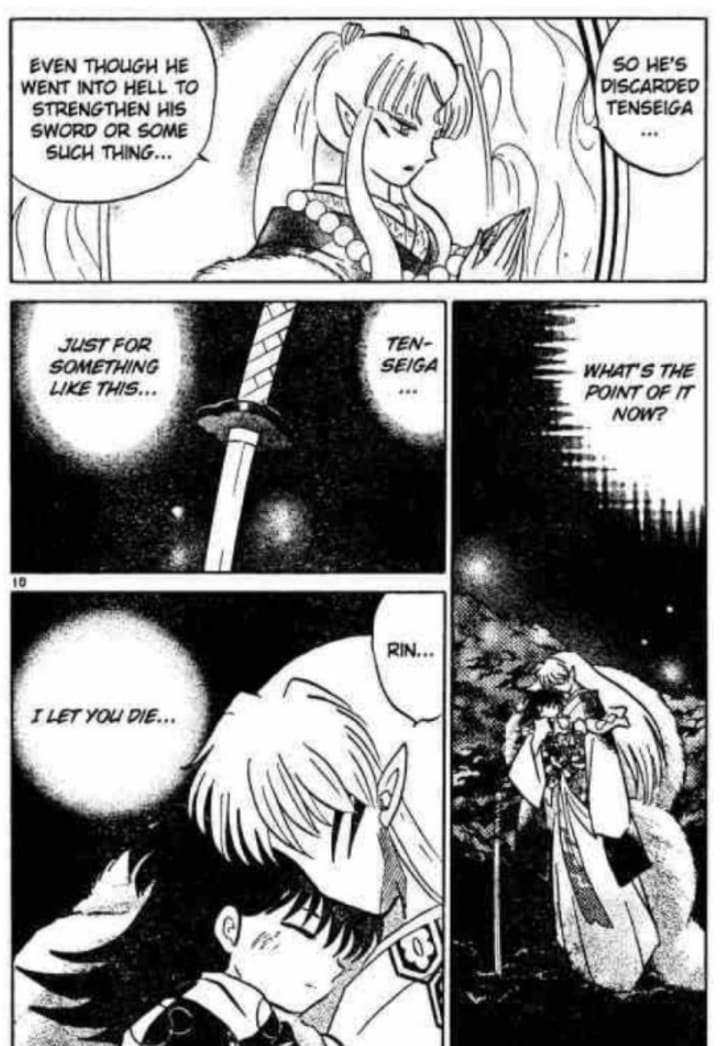
Rin's Second Death and Revival
There are plenty of recounts of InuYasha The Final Act episode 9, another milestone for Sesshomaru and Rin's development. Here, we witness Sesshomaru undergo major character development and a depiction of his rawest, most uncontrollable emotions characterized by overwhelming grief and guilt. Exchanging Rin's life for power is unthinkable. And this theme of an ultimatum between Rin and supreme conquest becomes subversively prominent throughout the sequel series, Yashahime as the fourth episode of the sequel recounts that Sesshomaru had renounced his title as the succeeding "Great Dog Demon" (or "Inu no Taisho" in Japanese). At the moment of publication, the reason for his abdication has yet to have been explicitly stated. Nonetheless, the logical deduction would be his prioritization of Rin and his subsequent family over the path of supreme conquest. Needless to say, retrospectively, it becomes clear that episode 9 of The Final Act foreshadows elements and key events of the sequel, Yashahime.
In his fit of grief, Sesshomaru answers the calls of the dead souls in the underworld who wish to be purified. He satisfies their wish in his weakest moments and unintentionally commits an act of kindness ("a good deed"). Even in death, Rin pushes Sesshomaru to grow and be a better person. This burst of light is followed by his subsequent return to his mother's castle in the sky where the others recap the events of the underworld. In response to her son's overwhelming grief and sadness, Sesshomaru's mother revives Rin once again, indicating her concern for her son's (mental) well-being. Recognizing the happiness that Rin brings Sesshomaru, she does not question the confusing nature of their connection further.
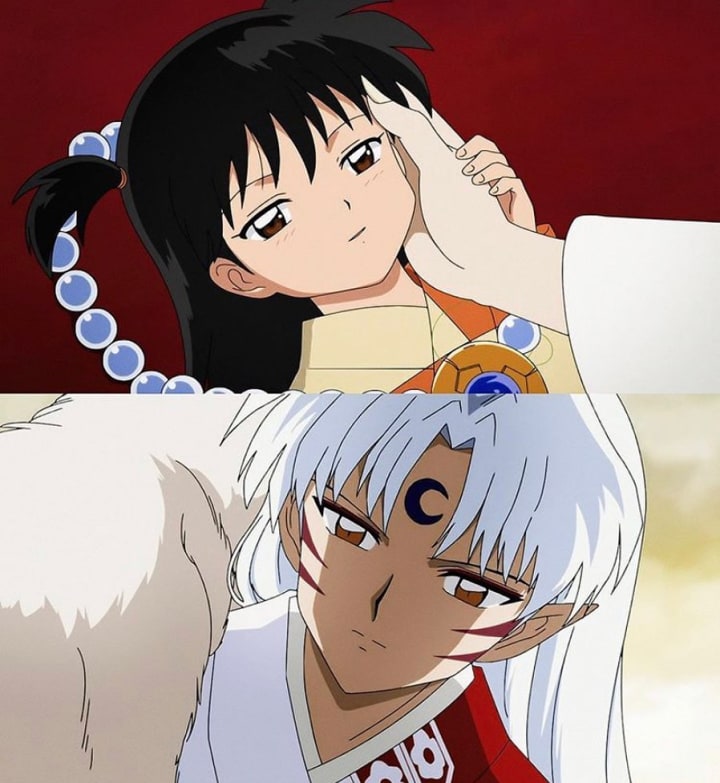
Upon her revival, Sesshomaru and Rin yet again share another "soulful gaze" "but this one was much deeper, and far more emotional, signifying the growth between their bond," as Lawless Lane comments (Lawless Lane, "Sesshomaru and Rin: The Silent Soul Love").
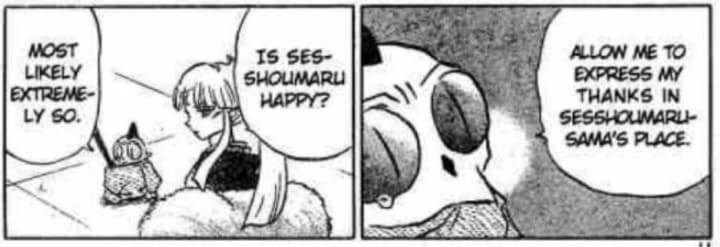
Throughout the series, we see little (non-hostile) physical contact between Sesshomaru and just about anyone. Sure, he punches Jaken, and that could be interpreted to be out of endearment. But Rin is the only person with who he actively initiates compassionate physical contact. When she was first revived, he holds her fragilely and leans her against his unarmoured shoulder. In her second revival, he does something even more daring and places his pale hand on her now warm cheek. This signifies a large growth in their dynamic, a degree of comfort between the two, and the strong non-verbal communication they maintain. Rin barely even smiles when she wakes up, and Sesshomaru does not move his lips to indicate a grin either. But both of their eyes carry the weight of peace, contentment, and pure happiness, even verbalized by Jaken. They exchange few words, "You're alright now, Rin." "I am." There are no "thanks," no "I was worried about you," or a "thank god you're back," Rin doesn't even initiate conversation — Sesshomaru does. Because it's just understood, even more so the second time around. Moreover, because they don't have expectations out of each other.
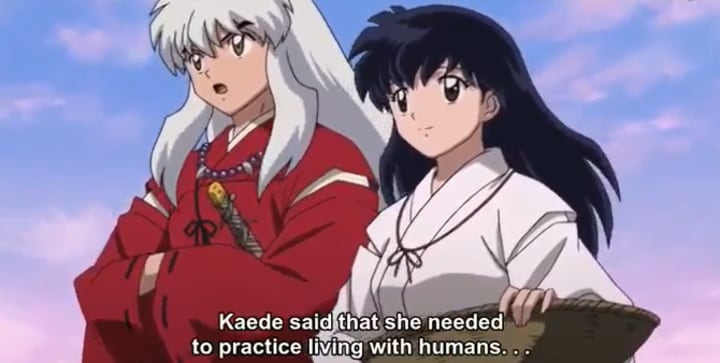
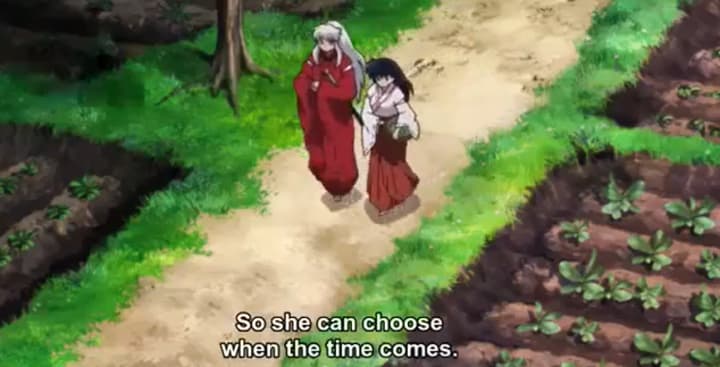
Finale
Ultimately, at the end of the original series, when Sesshomaru decides to leave Rin in Kaede's village, this is the healthiest and most selfless thing for both parties to do. This brings us back in full circle to the keyword, "choice." Sesshomaru knows that if Rin were to follow him in her youth, she would be the only life she'd know and that does not offer her choice or agency in the long-run. Her autonomy to be someone outside of "Sesshomaru's travelling companion" (who consistently is kidnapped to leverage Sesshomaru's weakness) is finally offered and played out. It is only then, upon knowing a life exogenous of Sesshomaru, can she truly make a decision to actually be with him one day, in whatever role they both may see fit.
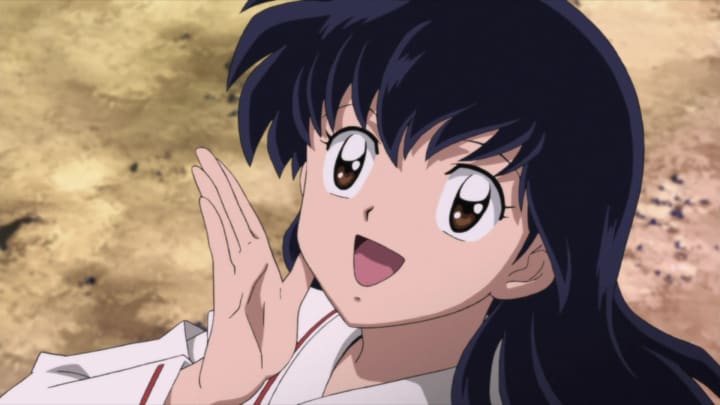
Rin "practices" living with humans to A.) socially reintegrate her back into society; B.) develop herself outside of Sesshomaru; and C.) live in peace and safety, away from the imminent, constant, and ongoing threats of a demon's life. This isn't only for Rin's sake though. Their separation is for Sesshomaru too. Although many view Rin to be dependent on Sesshomaru, Sesshomaru is equally dependent on Rin. He must also learn to be a truly great demon and practice that compassion that Rin taught him outside of Rin. Sesshomaru's sympathy for Kagura, acceptance of Kohaku, tolerance and protection of Kagome, and forgiveness towards Sango were products of Rin's consistent and ongoing influence on him. Just like how Toga commissioned Totosai to create Tenseiga out of the love and compassion that Izaiyoi showed him, so too must Sesshomaru learn, practice, and pass on these valuable lessons of empathy and connection.
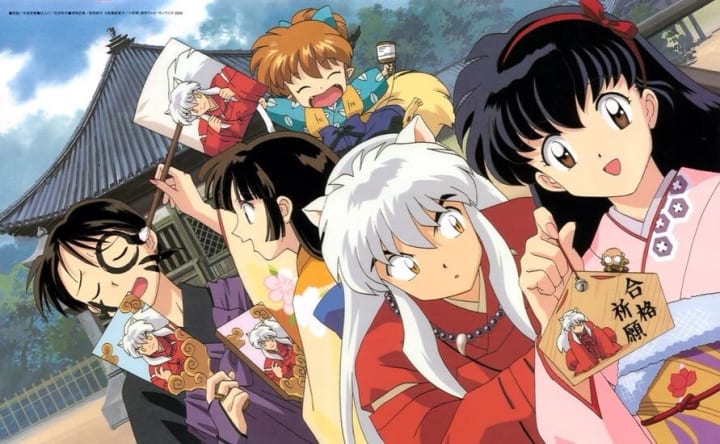
Concluding Thoughts
Because Sesshomaru and Rin are so largely built on respect, agency, and managing expectations (or lack thereof), their dynamic is unique and I’d say one of, if not, the healthiest dynamic depicted in the franchise. Kagome (age 15) and InuYasha (age 200+, physically age 15) met at the same emotional intelligence level. Their circumstances were already bathed in expectations, especially on InuYasha’s end regarding his unresolved feelings with Kikyo and projecting them onto Kagome. With Miroku and Sango, their relationship was consistently characterized by jealousy and flirtation — something that drove them apart but also eventually brought them together. InuYasha and Kagome have countless moments of dysfunction, mainly related to Kikyo, but their chemistry is indisputable. They had trouble managing their expectations and agency from each other and this was the central crisis for their love triangle. Miroku had grown up believing his fate would repeat his father’s, inevitably being sucked into his greatest strength and weakness. Of course, his only escape was the lightheartedness of flirtation and his "cursed hand" (which in real life, by the way, I don’t condone but in fiction that’s a different story). His flirtatious tendencies were his outlet, his out, his coping mechanism for an inevitably tragic fate and in his mind, something he probably might not even get the chance to do (that being producing an heir). Sango had just recently lost her entire family and hometown. She was only 16 years old. Tragedy and horror were the freshest for her out of the entire main cast. With all of this in mind, accounting for her age, of course, she couldn’t handle managing her emotions and she ended up internalizing the feelings and insecurities she had about Miroku.
I want to insert a disclaimer here that I don't mean to actively put down other pairings. I’m a huge InuKag stan and I love MirSan with all my heart, but if I had to be objective about the level of healthy qualities their relationships portrayed, they lag in comparison to SessRin. That’s not to say that SessRin is perfect, because the emotional connection between InuYasha and Kagome could be an essay in and of itself —it’s extremely powerful and beautiful, discussing the feelings that literally transcend and defy time, especially considering Inuyasha's overwhelming understanding of Kagome's life in the modern era. InuYasha's understanding of Kagome's duties and responsibilities in the modern era at the end of The Final Act speaks volumes. I love InuKag because it parallels a lot with SessRin in the same vein. And MirSan also embodies aspects of Sesshomaru and Rin’s dynamic: proving that a friendship can evolve into something beautiful over time and with the development of trust and communication.
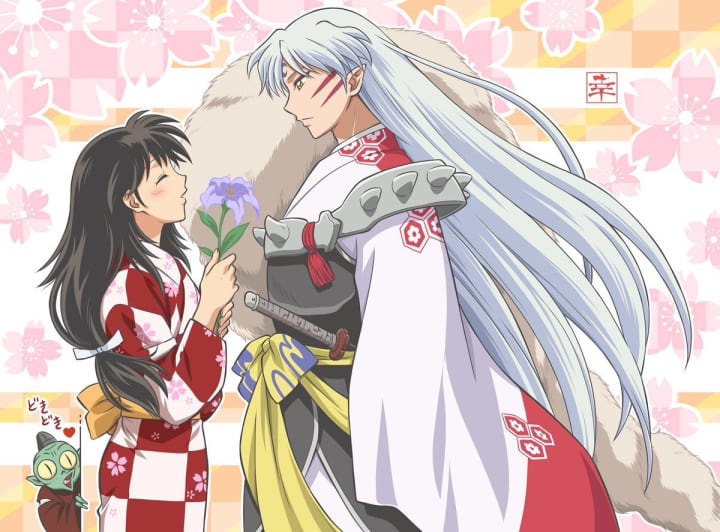
In conclusion, Sesshomaru and Rin’s dynamic in the franchise (anime, manga, and drama CD) epitomize countless upstanding aspects of a healthy relationship. There is no jealousy, no trespassing of personal space. The expectations are minimal, the understanding of each other’s baggage is reciprocal. Their relationship even inadvertently covers the diversity of what it means to be disabled and form a bond. Sesshomaru lost his left arm and Rin lost her voice due to, for both of them, the most traumatic events in their lives (Sesshomaru's strained relationship with his father and subsequent insecurity and Rin's lost family). But through the power of each other’s influence and how they see another, they regained these abilities. I’m not saying that in real life if you find your soulmate or someone you deeply connect with, that they will fix everything "wrong." But they’ll make those things more bearable and tread through those challenges with you. SessRin regaining these abilities only emphasizes this metaphor further — that through a strong bond, trust, respect, introspective and self-less growth alongside compassion, can you truly heal yourself and others.
Everyone in the InuYasha cast underwent an immeasurable amount of trauma. InuYasha had lived in a world that only showed him discrimination, even from his own kin. Kagome lost her father at a young age and was exposed to a world that imposed a heavy burden on her at age 15. Shippo saw his father used as an accessory and lost him as a child. Miroku witnessed his father’s pitiful death and was explicitly told that will be him in due time. Sango watched her brother slaughter her family and village in one night. Sesshomaru was left with an overbearing inferiority complex and fear of the inability to protect, even reprimanded by his own father, probably the only person he had respected, only for his father to favour his younger half-brother without any explanation. The grief, trauma, and scars that are left on our cast are noticeable and deeply ingrained in each character. For Sesshomaru and Rin, healing each other’s pain was what connected the two. Though unspoken, their friendship, connection, and eventual romantic love for another symbolize the deeper connotations of what a good dynamic and eventual romantic relationship look like. SessRin set the foundation for a healthy dynamic both platonically and romantically.
And that’s my case for why Sesshomaru and Rin have the healthiest dynamic and subsequent romantic relationship in the InuYasha franchise.
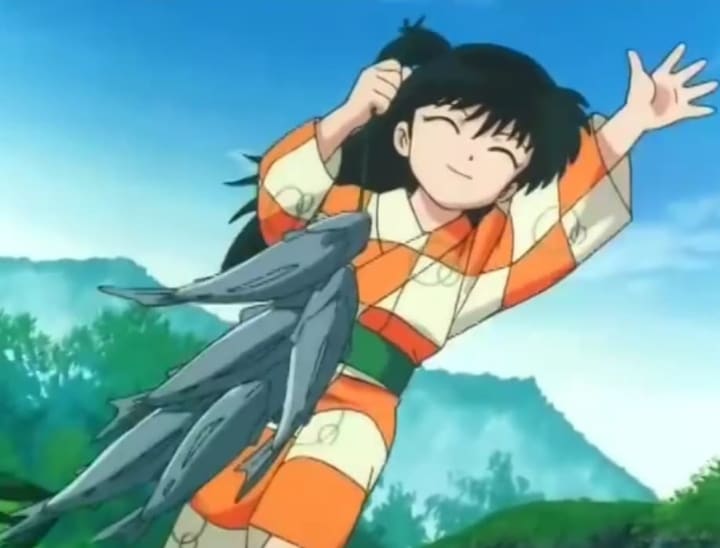
Bonuses: The Considerate Sides of SessRin — "The Little Things"
- Rin is often seen picking flowers alongside Sesshomaru's entourage. It is likely that Sesshomaru chooses the most flower-bound paths for them to journey on for her enjoyment.
- When Rin returns with the vegetables to offer to Sesshomaru in episode 35, Sesshomaru is seemingly fully healed. He likely stayed there, knowing Rin would return.
- Rin completely understands what Sesshomaru means when he speaks, regardless of how convoluted/cryptic or stubborn he may sound. In The Final Act Episode 15, he disposes of Tenseiga stating he has no need for it anymore. She takes the sword from Totosai despite Sesshomaru's angst and says she'll return it to him when he's in a better mood. This signals her understanding of his character, seeking things out in his best interest as she knows him so well. Likewise, she understands his tongue-twister immediately in the drama CD.
- Rin picks flowers for Sesshomaru (episode 79) as if it is a regular occurrence. It likely is, just off-screen.
- Sesshomaru uses comparatively more respectful language/tones when speaking to Rin. I'd like to think the lack of honourifics with her is different from his lack of honourifics with Jaken/InuYasha because he feels especially close to her.
- Rumiko Takahashi had stated in a Q&A from Shonen Sunday Super (translation provided by @eERIchan via Tumblr) that Sesshomaru visually curates Rin's fashion and commanded Jaken to find a kimono that suited Rin, fitting to her style and cheerful disposition. Since he chose her outfit, he must have also picked out her orange scrunchie to match.
- Sesshomaru's ability to wield Tetstuaiga on rare occasions (episode 133/134 and Movie 3) can be attributed to Rin's influence on his heart. She helps him unlock all of his power-ups.
- Rin unashamedly consistently hints at Sesshomaru's love life throughout the franchise. "She sure was pretty" (re: Sara Asano, episode 133), "I think she secretly likes Sesshomaru" (re: Kagura, episode 166). Her approach to the other aspects of Sesshomaru's life outside of battle/conquest/power is quite endearing and epitomizes the humanity she sees in him, as well as her perception of him: a multi-dimensional being beyond a sword and title.
References
@bamb.bieun. Fanart of Sesshomaru & Adult!Rin. via Instagram. November 6, 2020.
Ninetails2000. YouTube comment: "Sesshomaru, Rin and Jaken Funniest Moments." 2018.
@Dreambu17137701 "She knew he had a dark side..." via Twitter. November 12, 2020.
@KVndie. "Instead of calling her a girl..." via Twitter. December 31, 2020.
"Rin, Trivia." InuYasha Wiki powered by Fandom.com
Lawless Lane. "Sesshomaru and Rin: The Silent Soul Love." via Vocal Media. November 2020.
Anime:
- Episode 5
- Episode 35
- Episode 39
- Episode 44
- Episode 75
- Episode 80
- Episode 96
- Episode 99
- Episode 111
- Episode 162
- Episode 166
- The Final Act: Episode 9
- The Final Act Episode 15
- Final Act Episode 26
- Inuyasha Movie 3: Swords of an Honorable Ruler
Manga:
- Chapter 129
- Chapter 157
- Chapter 219
- Chapter 253
- Chapter 468
- Chapter 469
- Chapter 470
- Chapter 471
- Chapter 537
About the Creator
bakasaiga
she/her
Thanks for reading!

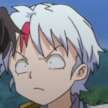




Comments
There are no comments for this story
Be the first to respond and start the conversation.